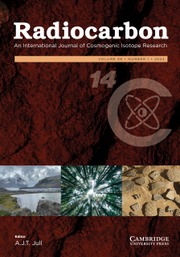Article contents
Sample Dilution for AMS 14C Analysis of Small Samples (30–150 μg C)
Published online by Cambridge University Press: 18 July 2016
Abstract
We investigated sample dilution as a technique for accelerator mass spectrometry (AMS) radiocarbon analysis of very small samples (down to 30 μg). By diluting such samples up to a total weight of 200 μg, we can still perform reliable AMS measurements and improve the success rate significantly for targets that are difficult to measure. A disadvantage of this dilution technique is a loss of measurement precision. In addition, calculations of the 14C/12C isotope ratios and the uncertainties therein are not straightforward because of peculiarities in isotope fractionation processes in the AMS system. Therefore, to make sample dilution a routine method in our laboratory, we did extensive theoretical and experimental research to find the optimum conditions for all relevant parameters. Here, we report on the first detailed study dealing with all aspects of sample dilution. Our results can be applied in general. As an illustrative test case, we analyze 14C data for CO2 extracted from an ice core, from which samples of 35 μg C or less are available.
- Type
- Articles
- Information
- Copyright
- Copyright © 2008 by the Arizona Board of Regents on behalf of the University of Arizona
References
- 6
- Cited by


